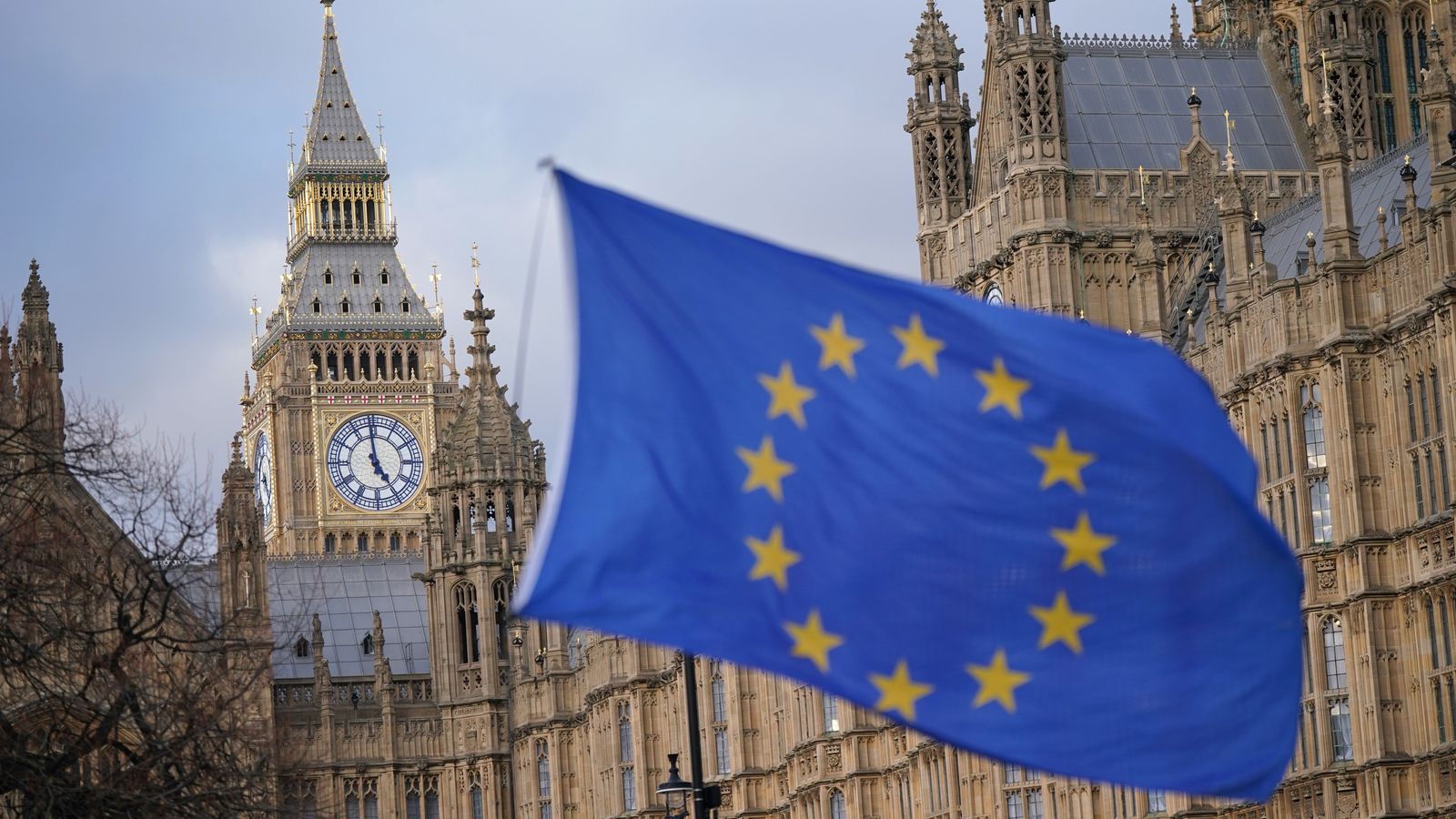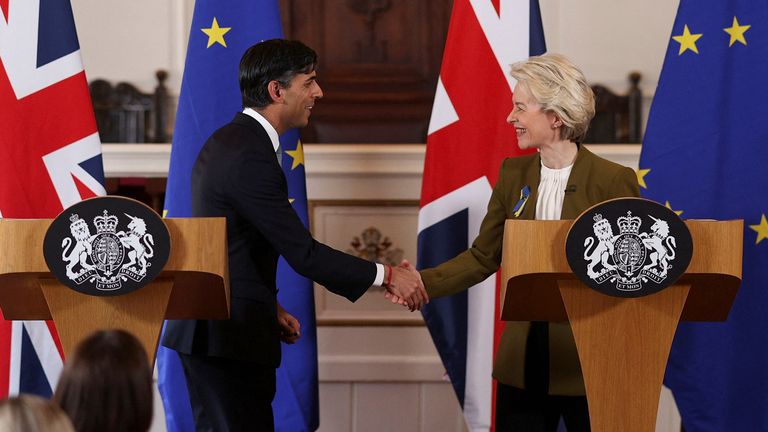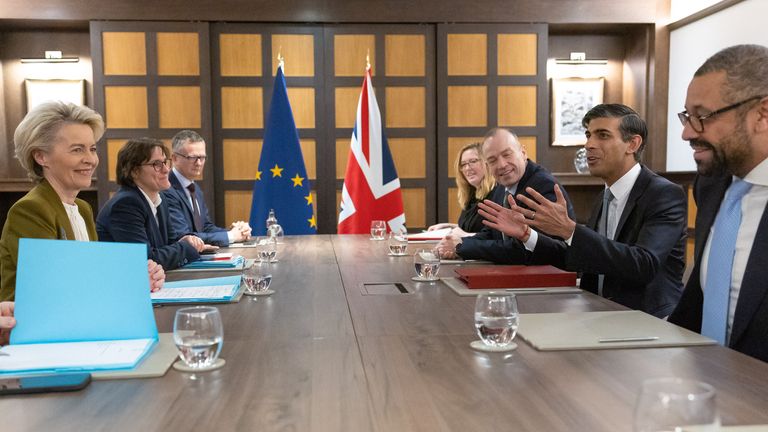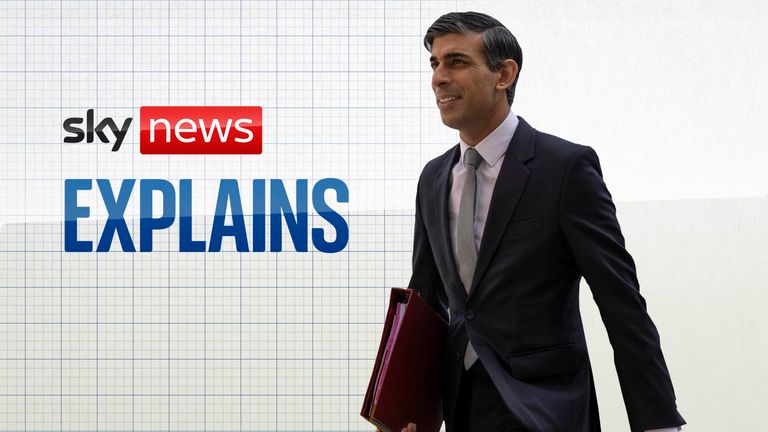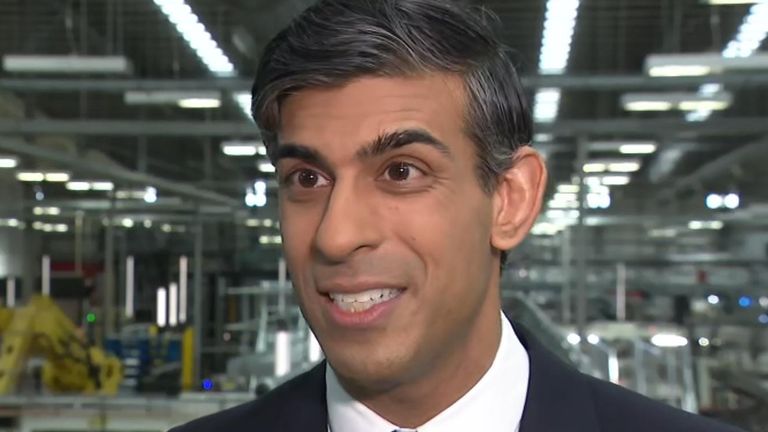Forget the politics. The plaudits. The tiny number of entries on the rebellion spreadsheets. The cries that Brexit is over. Forget the reports saying it’s been Rishi Sunak’s best day since becoming prime minister.
Arguably what matters much more is the massive further constitutional and political change set to be enacted within our borders – largely affecting Northern Ireland. Just how big a deal is this really?
The PM announced a deal on Monday that will change Northern Ireland’s place within the EU’s single market by eradicating some EU-imposed checks that had to be carried out on goods heading west over the Irish sea.
Sunak ‘over the moon’ with deal – as he tours Northern Ireland – politics latest
However, this deal will not end EU law in Northern Ireland nor the ultimate oversight of EU judges in limited circumstances – something which Rishi Sunak has been candid about, but nevertheless places that nation on a different course from the rest of the UK.
And far from playing down the differences across the Union of the United Kingdom, Rishi Sunak has been selling Northern Ireland’s special status and different constitutional arrangements very hard – telling everyone it is an advantage.
In Belfast, the PM described it as an “unbelievably special position” and a “unique position in the entire world” because Northern Ireland retains “privileged access” to “the European Union single market”.
Mr Sunak makes it sound so good that some people on the British mainland might start getting jealous – perhaps an odd stance coming from a Brexiteer who purported to want to leave the single market.
There is no question Sunak has negotiated an ambitious deal out of reach of his predecessors. But just how much EU law is left, and could Northern Ireland still look very different to the rest of the UK in 20 years?
No more new EU laws?
The most remarkable part of the negotiation is the “veto” on new EU single market laws which will apply in Northern Ireland. This has attracted plaudits from Brexiteers and unionists.
However, it is unclear how often it will be applied. Might it be in practice that only a handful of new EU laws are blocked this way, and the vast majority are still implemented? Early signs suggest this is the case, rather than it being used as a wholesale blocking mechanism.
The EU briefing paper on the Commission website says of the new veto: “This mechanism would be triggered under the most exceptional circumstances and as a matter of last resort”, making clear there is no expectation that it should be used regularly.
The details set out in the UK paper also make this obvious. Firstly, the entire mechanism requires the Stormont assembly to be back up and running to work, which – as things stand – still seems unlikely.
It can only be used on “non-trivial” issues, with the UK government, not Northern Irish politicians, determining what is “trivial”.
Read more:
Five key sections of the new post-Brexit deal
What are the DUP’s seven tests?
Beth Rigby analysis: New UK-EU deal might not be the slam dunk PM is hoping for
It requires 30 members of two parties in the Assembly to agree for the “brake” to be triggered.
The UK government must be minded to agree too, aware of the diplomatic wrangling and blowback it will cause and often having different policy goals. EU trade deals cannot be subject to a veto, or measures to prevent fraud.
And it must be proved in writing that the veto is being used as a last resort, with other measures – like the whole of the UK implementing the EU rule – having to be considered first.
Finally, if Northern Ireland does use its veto, it can be punished by the EU by imposing other sanctions.
The UK document says: “It is important to note that the permanent disapplication of the rules would mean divergence between Northern Ireland and Ireland (and the broader EU), and thus it would be a matter for the EU how to deal with the consequent impact on their market. Recognising this, the EU will have the ability to take ‘appropriate remedial measures’.”
As a consequence, none of this makes it sound like the veto at the heart of the deal will be in regular use: is it really a lever to look at and admire rather than pull?
What happens to existing single market goods laws?
They remain in place for firms in Northern Ireland. The documentation makes clear that as part of this process, the EU will now be “disapplying over 1,700 pages of EU law in the process, and the ECJ oversight which comes with it”.
However, the law being disapplied is not EU law in force in Northern Ireland, but instead the EU rules on trade introduced as part of Boris Johnson’s Brexit deal introducing checks on goods from Great Britain to Northern Ireland.
Or, in the words of the UK government document: “disapplication (is) of core parts of the EU customs code and SPS rules for internal UK trade”. This new policy – green lanes with almost no checks for GB goods going to Northern Ireland – is a big win, but the EU can remove it at any time if they are unhappy with its operation.
Has the UK got complete control of VAT and subsidy policy?
The headline is simple enough – that Westminster has taken back control from Brussels of the ability to set certain tax rates and determine state aid levels for business, something which bothered Rishi Sunak back when he was chancellor.
The reality is, of course, less straightforward. In practice, Westminster has much more freedom than it did – but it is not sovereign in these areas in the way Brexiteers would like. Rather than blanket changes, the EU has granted specific exemptions on VAT – for instance, the UK can apply reduced VAT rates on goods such as heat pumps supplied and installed in properties and does not need to apply the special EU VAT scheme for small enterprises in Northern Ireland provided the business turnover is not bigger than an EU-wide set level.
However, the EU and UK have only agreed to “explore establishing” a list of goods not being at risk of entering the EU which would not be subject to EU VAT rules. And while alcohol taxes will in future be levied in Northern Ireland by strength, the same way they are in the rest of Britain, “the UK will not be able to apply any duty rate below the EU minima.”
These are all limits that Northern Ireland politicians will have to put up with for generations to come. On state aid, a new declaration clarifies and narrows the scope of what Brussels can determine on state aid but, according to the EU Commission document, it is still the case “Article 10(1) of the Protocol makes EU State aid rules applicable in Northern Ireland.”
What happens in the future?
All MPs are, understandably, evaluating the new Windsor Framework on the basis of what it means for the politics of today and the next election. But what about 20 years time?
In particular, what if Britain wants to take bolder advantage of its Brexit freedoms? Here the UK document is fascinatingly mercurial. It says it understands the EU has made compromises in protecting the EU single market and adds that the UK government moving away from EU standards remains a possibility.
“Inherent in this new way forward is the prospect of significant divergence between the two distinct economies on the island of Ireland – from food and drink to plants and pets, building on the existing differences in every area of economic and political life such as services, migration, currency and taxation.”
The answer to that prospect of divergence is potentially more intense monitoring of goods moving between Northern Ireland and the Republic.
“This will require increased market surveillance North-South in some instances to ensure that there is no abuse of these arrangements to move goods across the international border from Northern Ireland into Ireland, and new requirements on Ireland and other EU Member States to ensure that sensitive products such as food are not moved illegally across that international border.”
It is not, however, clear what that “market surveillance” will amount to.
Sunak has solved many of today’s problems left behind by Boris Johnson’s Brexit deal in Northern Ireland. However, nobody can say what this week’s deal means for the constitutional, political economic status of Northern Ireland in 20 years time – that can only be guesswork.
